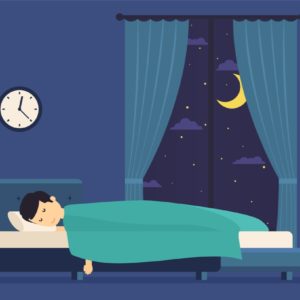
During the COVID-19 pandemic, the Centre for Specialist Psychological Therapies at Cumbria, Northumberland, Tyne and Wear NHS Foundation Trust (CNTW) has been running wellbeing livecasts.
Each week, staff are invited to join a livecast which covers a specific topic. Clinical psychologist Dr Tom Christodoulides works in a community treatment team in Sunderland. He has an interest in sleeping problems and how Cognitive Behavioural Therapy (CBT) can be used as an intervention for sleep.
“The average length of time someone sleeps has dropped from 8.5 hours in the 1950s to 6.5-7 hours. There has been a big drop in a short space of time. There are several reasons for this including increased use of technology, artificial light, alcohol and coffee, demands and stress.
“Getting a good night’s sleep is really important. It is essential for the brain’s development and its ability to learn and remember. It reduces the chance of heart attack and can increase immune cells which reduce the risk of cancer. It’s important for our mental health too. Sleep has positive effects on emotional regulation, anxiety, depression and psychosis.
“Insomnia is an extremely common condition, but can still have a serious impact on our wellbeing. As it is commonly triggered by stressful conditions, the current pandemic and lockdown has triggered insomnia for many people. Our sleep usually returns to normal without us doing anything, but if insomnia continues, there are lots of things you can try to help.
“Insomnia is not just a side effect of other mental health disorders, it should be addressed in its own right. Good sleep hygiene practices are good place to start – include making the bedroom a tech-free zone, limiting alcohol and caffeine, having a healthy diet, and having a dark sleeping environment with an ideal temperature of 18 degrees. If these changes don’t make a difference, then there are a number of other evidence based interventions to try. These include:
• Keep a regular sleep routine, by going to bed and getting up at the same time every day
• Daily exercise of 20 minutes
• Getting an hour’s exposure to sunlight every day
• Learning to manage your worries, for example keeping a worry notebook or doing regular relaxation techniques
• Try not to put any effort into going to sleep. If you try to do the opposite and keep your eyes open, this may help you drift off.
• If you still can’t go to sleep, don’t stay in bed worrying. Get out of bed and do something else. Limit the time you spend in bed awake to about 15 minutes.
• If you find yourself lying awake every night, try delaying your bedtime, but still getting up at the same time every day. This can help you get a stronger, better quality sleep that is less fragmented.
You can also seek help with sleep from your GP or a qualified clinician in CNTW.
More sleep resources can be found here.
You can listen to all of the livecasts on the CNTW YouTube channel.
